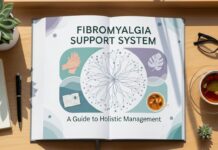Introduction
Living with type 2 diabetes: It’s not all about blood sugar checks. Many people have that feeling of being tired, and that feeling never seems to disappear. This is more than feeling sleepy at the end of the day. It is a constant struggle with fatigue. Management of this type 2 diabetes lifestyle challenge of fatigue is important to remain active and independent.
And why, even after eating well or resting, your energy levels are still getting lower and lower? The answer lies in how your body reacts to glucose, how well you are sleeping and how well stress affects your system. The good news? Fatigue can be managed. With some simple lifestyle hacks, the energy returns, the mood improves and the daily functions become lighter.
Managing daily challenges matters too. Tips for coping with type 2 diabetes fatigue and a routine to reduce arthritis knee flare-ups can improve comfort. Also, untreated atrial fibrillation can raise stroke risk, making timely care vital.
Understanding the Nature of Fatigue of Diabetes
Tiredness in diabetes doesn’t always get better with rest. That’s why it feels different than normal fatigue. When the blood sugar is too high, your cells cannot access the glucose well. The body is starved of usable energy although there may be sufficient amounts of food intake.
There are other factors involved. Nerve damage causes a slowdown in the communication between brain and muscles. Circulation problems decrease supply of oxygen. Stress hormones such as cortisol raise sugar levels. Over the course of a while, each element develops a circular loop of tiredness.
Signs include trouble in concentration, weakness of muscles, and irritability. Some feel uniformly drained even at the end of a full night’s sleep. Others take caffeine or take a nap but still feel sluggish. It helps to recognize these signs as early as possible when choosing the right hacks to perform.
Four Pillars Of Energy Management
Imagine the energy to be a house with four sturdy pillars. And if one of the pillars is weak, the structure shakes. For diabetes fatigue those four pillars are:
- Food balance.
- Daily movement.
- Quality sleep.
- Stress control.
Stabilizing all four leads to constant energy during the day.
Nutrition for Sustainable Energy
Balanced Meals
Food is your primary fuel. The trick is to select food that keeps sugar levels steady. Large amounts of refined carbs result in spikes, then crashes. These ups and downs aggravate fatigue.
A smart plate is one that has protein, fiber, and healthy fat all together. For instance, grilled chicken with vegetables and olive oil slowly releases glucose. Whole grains take longer to digest than white bread, which makes you stay more satiated.
Small Frequent Meals
Eating smaller amounts every three to four hours prevents drops in energy. A small amount of nuts or a boiled egg between meals keeps the level of sugar stable. This pattern also decreases craving for sweets.
Hydration Matters
Dehydration is often mistaken for fatigue. Staying hydrated with sufficient intake of water increases circulation and mental clarity. Soda to the lemon water, which prevents spikes in sugar. Teas made from herbs are also calming.
Similar strategies are recommended as part of diet plan for fatty liver disease which is not caused by alcohol, because the balanced meals, low sugar intake, and hydration play vital roles in energy and organ health.

Treatments may bring side effects. Be aware of neuropathy from prolonged chemotherapy and explore autoimmune pancreatitis treatment in children to support better care choices.
Exercise As a Natural Energy Booster
Gentle Daily Activity
Exercise doesn’t always mean heavy exercise. For people with diabetes fatigue, light activity is best. Stiff muscles are also awakened by morning stretching. A 10 min walk after lunch enhances digestion and reduces sugar levels after eating.
Strength and Endurance
Stronger muscles utilize glucose better so we feel less tired. You gain stamina and activities of daily living become easier.
The principle is similar to methods employed in arthritis knee flare-ups in daily routine exercises as gentle, consistent movement keeps joints protected and keeps them from becoming stiff.
Sleep and Recovery
Importance of Rest
Sleeping poorly makes tiredness worse. In fact, people who have unstable sleep try to wake up with elevated blood sugar. Good sleep is as important as nutritious food.
Practical Hacks
- Stick to a regular bedtime.
- Purchase a dark room and keep it a little chilled.
- Avoid heavy meals near the time to go to bed.
Relaxation rituals such as reading or gently breathing tell the body it’s time to rest.
Similar approaches are used with sleep hygiene for fibromyalgia, where set sleeping patterns relieve pain and lead to better class.
Stress & Emotional Balance
How Stress Worsens Fatigue
Stress releases hormones that cause an increase in blood sugar. This corresponds to another load on the energy levels. Constant stress also impacts sleep and appetite.
Hacks for Stress Relief
- Five minutes of deep breathing restores the nervous system.
- Time outside reduces cortisol.
- Mental clutter is eliminated by writing down thoughts.
Stress management is not an option. It’s all part of keeping fatigue under control.
A Daily Framework for Energy
Here’s a sample of a structure that you can follow. It’s flexible but gives balance:
| Time | Routine | Why It Works |
|---|---|---|
| 7:00 am | Stretch + hydration | Wakes body and mind |
| 8:00 am | Protein-rich breakfast | Prevents sugar spikes |
| 12:30 pm | Balanced lunch + walk | Supports digestion, lowers fatigue |
| 3:00 pm | Mindful pause | Controls stress hormones |
| 6:00 pm | Light dinner | Improves sleep readiness |
| 10:00 pm | Bedtime ritual | Enhances recovery |
This isn’t a hard and fast rule book but rather a framework. Regularity is what makes it work.
Connecting With Other Chronic Conditions
Fatigue tends to cut across the illnesses. Strategies for one condition will often support that of another.
- For chronic kidney disease stage 3 reducing salt and fluids limits swelling as well as boosting energy for diabetes patients.
- Gentle breathing exercises (same ones as exercises taught to people with chronic obstructive lung disease) increase the oxygen supply and stamina.
- Relaxation techniques involved in treating chronic migraine without medications, such as hydration, meditation and screen time reduction are also effective to control diabetes fatigue.
The key lesson is this: One lifestyle hack can help with multiple conditions. This makes the work more productive.
Staying healthy starts with awareness. Learn about lifestyle changes to prevent Alzheimer’s disease, the first symptoms of Parkinson’s disease, and the early signs of thyroid cancer in women to catch problems early.
Advanced Hacks to Manage your Energy
Basic lifestyle pillars put on the foundation. But, with the more sophisticated methods comes the long-term stability. These hacks extend past diet and exercise. They address the topics of mindset and body systems and environment.
Energy management is all about balance. Too much pressure on one area puts pressure. It is through a combination of little, sophisticated strategies that you build strong routines.
Tracking Energy Patterns
Why Tracking Matters
Your body follows rhythms. Energy rises and falls at various times. Keeping a record will help spot the patterns. And once you know the overall trend, routines can be adjusted.
For instance, some people wear themselves out the most as the afternoon wears on following lunch. Taking a short walk then can stave off a slump. Others feel drained out in the late evening. Adjusting meal portions may be helpful.
How to Track
A simple diary works. Take note of sleep, meals, activity and energy level. Over weeks, patterns appear. Mobile health apps help to make tracking easier.
This record is not for personal use only. Doctors can look at it and make adjustments to medications.
Eating at the Right Time for More Energy
Food type matters. But timing matters too. Eating large meals late at night skyrockets blood sugar. It also disrupts the sleep.
Dividing calories through the day is a prerequisite to prevent hunger as well as fatigue. Balanced breakfast jump starts metabolism. Midday meals should be light so that they don’t cause you to become drowsy. Evening food should be regulated.
Similar adjustments are recommended for chronic kidney disease stage 3 patients. It makes digestion easier, decreases strain on the kidneys and helps to boost overall energy.

Mind-Body Practices
Relaxation Methods
Meditation, deep breathing and yoga help reduce cortisol. Stress Relief Directly Relies on Better Blood Sugar Control. And short daily lessons make a difference.
Visualization
Imagining peaceful scenes does relax the nervous system. It reduces the heart rate and eliminates mental tension. This technique is commonly utilized in the treatment of chronic illnesses.
Guided Movement
Tai chi or gentle yoga is a combination of relaxation and exercise. These techniques increase circulation and mood.
People have found that using relaxation can help them reduce migraines. The same process is beneficial for medical marijuana treatment for chronic migraine relieving migraines without medications, and diabetes fatigue relief.
Environment and Energy
Physical environment affects how tired you are. Stress is increased by poor lighting, clutter, or noise. A supportive state also helps make your mind less fatigued.
Home Adjustments
- Retain natural light during the day.
- Arrange things you need on a daily basis to prevent stress.
- Add plants for fresh air.
Workplace Adjustments
No more than an hour at a time – water breaks help re-start focus. Staking for too long increases fatigue. Height of desk is correct and chair allowing for easy adjustment.
Social Support For Fatigue Management
Diabetes fatigue can be isolating. Sharing issues with friends or support groups for others struggling will lessen the load.
Interacting with other people who have diabetes is inspiring. Tip and Throw It: Tips can be exchanged in the online communities. Accountability is assured by family support.
Socialization can also be a factor, as in arthritic flare-ups of the knees daily, for example. Many sufferers of joint pain are left to themselves. Community support dilutes that feeling, as it does for diabetes patients.
Medical Monitoring
Why Regular Check-Ups are Important
Lifestyle hacks are powerful things. But, medical advice is still needed. Doctors are looking for thyroid, anemia or vitamin deficiencies that masquerade as fatigue.
Medication Review
Some medicines used to treating diabetes can make one feel tired. Treatments or changes can help you with the problem. Changes should be reviewed by an Optometrist.
Lab Tests
Kidney function, vitamin levels and sugar levels give clues. Treats also avoid complications that aggravate fatigue.
For instance, chronic kidney disease stage 3 is usually associated with diabetes. Regular kidney checks can identify problems before they get too serious and help make changes in diet or medications.
Using Light Exercises
Beyond Walking
While, walking is good, a variety is better. Flexibility is worked in by using a stationary bike, light swimming and chair stretches. Each activity utilizes different muscles.
Breathing Exercises
Breathing in a slow, regular rhythm increases the supply of oxygen. This assists endurance and mental concentration. Such strategies are common as exercises with COPD patients.
Their effect on diabetes exhaustion is that it increases lung power and removes shortness of breath.
Nutrition Beyond the Basics
Micronutrient Support
Vitamins and minerals have their impact on energy. Deficiencies of vitamin D, magnesium or B12 causes weakness. Testing and supplementing as needed aids.
Fiber and Gut Health
This is because high fiber diets improve digestion and sugar control. Fermented foods such as yogurt improve bacteria in the gut. A healthy intestine is important for improved metabolism.
Caffeine and Alternatives
High doses of caffeine increase heart rate and interfere with sleep. For the evenings, teas, such as chamomile, are safer.
Psychological Resilience
It is discouraging to live with fatigue. Resilience avoids mental fatigue.
Positive Mindset
Pick Baby Steps To Keep Openness Alive. For example, one becomes more consistent with blood sugar when the reading is good.
Structured Goals
Creating realistic goals on a daily basis can prevent overwhelming. Rather than workout, try for a 15-minute walk.
Professional Help
Counseling or therapy helps the emotional health. Anxiety and depression tend to make fatigue worse. Healing is only possible when they can be discussed.
Advantages And Disadvantages of Life Hacks
Here is a well balanced examination of lifestyle approaches:
| Approach | Pros | Cons |
|---|---|---|
| Balanced Diet | Controls sugar, steady energy | Needs planning and discipline |
| Daily Exercise | Boosts stamina, improves mood | Initial fatigue possible |
| Sleep Hygiene | Better recovery, stable sugar | Requires routine changes |
| Stress Management | Lowers cortisol, improves focus | Needs consistency |
| Tracking Habits | Identifies personal triggers | Time-consuming at first |
The goal isn’t perfection. It’s progress. Decide to take small steps that pay big dividends over a lifetime’s time.
Real-Life Example
Consider Ali, a 52 year old with type 2 diabetes. As for the subjective evaluation, he complained of persistent afternoon sleepiness. He started keeping a diet journal and he noticed heavy meals like lunches consisting of rice were triggering the slump. By switching to quinoa instead of rice and by taking a brief walk out his energy got better.
He was also a deep breaths twice a day kind of guy. Within three weeks his concentration had been improved, and naps had considerably shortened. This is another example of how small changes have an impact.
Expert-Backed Strategies
Hacks and Lifestyle Hacks, on the other hand, are at their best when they have the medical science behind them. Experts will tell you that small, gradual changes add up to permanent results. Dr. Ann Albright from the CDC says there are no magic solutions, just daily structured habits. This means intensity is more important than consistency.
Endocrinologists also place pressure on regular check-ups. Blood testing guarantees improved energy level without harm. Registered dietitians emphasize portion control as the foundation of stable energy. Sleep experts note that good rest can help to manage glucose levels more effectively than medication can.
Combining Lifestyle & Medical Care
Don’t pick between medical care and life hacks. Both can work together. Medications are used to keep sugar levels in control. Lifestyle makes sure your body is able to use that balance for energy.
When you get techniques together, you cover more ground. For example, when people look at walking as an exercise, this reduces sugar in a natural way. Medication Management – Adjustments to medication are more effective. Quality sleep decreases stress hormones. Doctors can then order lower doses, which means fewer side effects.
This hypnosis medicine and lifestyle combination creates resilience.
Building Long-Term Routines
Why Long-Term Habits Matter
Quick fixes fade. Long-term routines stick. The habits only become automatic, when exhaustion improves. Habits are formed by repeating small steps to the point where they no longer seem like small steps.
Habit Formation
Begin making one change at a time. Substitute fruit for an evening snack. Once that is natural, introduce short walks. Slowly layer new habits. This technique avoids the possibility of burnout.
Accountability
Progress: Writing down goals and sharing progress helps to stay on track. A companion, coach or group is an additional motivator.
Technology And Employees – Fatigue Management
Digital Tools
Fitness apps monitor food intake, exercise, and blood sugar. Smartwatches tell you to move or rest. Continuous glucose monitors allow the trend to be displayed in real time.
Benefits
Technology allows instant feedback. This develops the drive to make changes before fatigue sets in. Data also helps doctors to make better recommendations.
Caution
Don’t rely only on apps. Human judgment is still key. Technology is a means not an end.
Non-Fundamental Strategies for Nutrition
Protein at Every Meal
Adding protein does lessen sugar spikes. Good choices include eggs, beans, fish and lean meat. Protein also helps with the repairs of muscles.
Plant-Based Options
Whole grains, legumes and vegetables supply fiber. Meatless meals decrease inflammation and aid in weight management.
Energy from Snacks
Substitute nuts or yogurt for chips. Balanced snacks help in maintaining the energy between meals.
These approaches also benefit conditions such as diet plan for non-alcoholic fatty liver disease, in which a diet low in sugar and controlled for fat content benefits both liver and energy health.

Emotional and Mental Health
Why Mental Health Matters
Diabetes fatigue is not just physical. It drains emotionally too. Constant fatigue may cause feelings of frustration or sadness. Physical exhaustion sets in: Mental health issues can interfere with sleep, thereby causing an increase of physical fatigue.
Coping Methods
Free yourself from stress by talking to a counselor. Mindfulness focuses change the brain to the present. Gratitude journaling helps you develop positive thinking.
Support Systems
Family support alleviates the sense of loneliness. Peer groups make you know you’re not alone. It is about the fact of these connections, which make us hopeful.
How Does Light Exercise Help?
Customized Movement
Some individuals cannot work out intensely. Fatigue is a condition in which more gentle approaches are needed. Slowed cycling, swimming or seated exercises protect joints while increasing circulation.
Breathing Practices
Parasympathetic Part: Deep breathing is under rated. It adds oxygen, relieves stress, and rejuvenates the focus. These techniques are commonly recommended as exercises for COPD patients. Use them in relation to diabetes burnout and they produce the same benefit.
Case Study: A Holistic Approach to Tackling Fatigue
Sara, 48 years old, was struggling with exhaustion on a day-to-day basis. She kept a diary for one month. She saw increased sugar after late night snacks. She substituted yogurt for them. It took two weeks for the sleep to improve.
And in the evening she included light yoga. Within a month, her stake of energy was longer through the day. After a steady read it was possible for her doctor to reduce one medication dose. Sara’s case is an example of how lifestyle and medical treatment go hand-in-hand.
Common Mistakes to Avoid
Skipping Meals
Sugar levels become unstable when you miss meals. Energy drops quickly. Rather, eat frequent light meals.
Overexercising
Overdoing your workouts makes you exhaustion. Balance intensity 7 recovery.
Ignoring Sleep
Caffeine taken late hinders sleeping. When you are consistently sleeping badly, the fatigue will be worse than if only a poor diet were an issue.
Stress Neglect
Some believe that stress doesn’t play a role in sugar. In fact, stress hormones increase sugar content and energy levels decrease. Avoidance of stress slows down development.
FAQs
1. Can diabetes-related exhaustion be cured?
Developers, with consistent lifestyle changes and medical support, can overcome fatigue. And it doesn’t go away completely but is controllable.
2. Will caffeine help fatigue of diabetes?
Caffeine in moderation can be stimulatory. But excess is disruptive to sleep and stressful. However, drinking herbal teas is safer.
3. How Does Sleep Affect Fatigue?
Too little sleep increases blood sugar and decreases recovery. One of the best fatigue hacks is having good sleep.
4. Why do you need energy supplements?
Testing will be done only if deficiencies are identified. Too little vitamin D, B12 or magnesium can lead to fatigue. Always confirm with a doctor.
5. Can you alleviate fatigue with stress control?
Power burns off, so balancing eating, physical activity, and sleeping does help but works better when there’s stress management in place. All pillars are synergistic with each other.
Putting It All Together
The Integrated Routine
Start small. Develop routines around meals, exercise, sleep and stress. Include safety medical surveillance. Layer in some advanced hacks such as tracking, meditation, and environmental tweaks.
The Payoff
Over weeks, energy improves. Tasks feel lighter. Confidence returns. Fatigue power is a reducing function.
Similar findings are found in following sleep hygiene for fibromyalgia. Sleeping in has not only pain-relief but restorative energy. Diabetes patients achieve the same effect with consistency.

Conclusion
Patience is the key to overcoming diabetes fatigue. There is no one-size-fits-all solution that something can accomplish for you instantly. But simple lifestyle hacks that have consistent application and therefore have a constant role play a game-change along with medical care. Well-rounded meals, gentle exercise, good rest and stress relief are the hallmarks.
Consistency turns fatigue into manageable shifts in energy. Emotions with time become habits and life becomes easier. By putting these steps together, you not only fight fatigue but also save long-term health.









